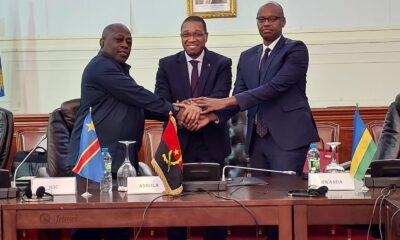Politics
The 20th Gatumba genocide commemoration by the Banyamulenge community.
At vero eos et accusamus et iusto odio dignissimos ducimus qui blanditiis praesentium voluptatum deleniti.
On August 13, 2004, members of the National Forces of Liberation (Forces nationales de liberation, FNL) targeted primarily Banyamulenge refugees, Congolese Tutsis from the region of South Kivu, in the eastern Democratic Republic of Congo, based on their ethnicity. Other ethnically diverse refugees and Burundians residing in another area of the camp were spared by the FNL, a primarily Hutu rebel group in Burundi.
19 years after an armed attack on a Burundian refugee camp, the families of the victims continue to pray for justice and restitution. More than 166 Congolese civilians were killed and another 106 were injured when the Gatumba refugee camp in Burundi was attacked.
A criminal case initially began in 2013, but it came to a halt in 2014 and hasn’t started up again since. The judiciary must be protected from political influence by the Burundian government, and justice must be served in conformity with both domestic and international law.
The FNL immediately claimed responsibility for the attack following the massacre. However, Pasteur Habimana, who served as the group’s spokesperson at the time, later denied making that claim. In 2009, the civil war came to an end when the FNL, the military wing of the Party for the Liberation of the Hutu People-National Forces of Liberation (Palipehutu-FNL), disarmed.
However, justice in this case appears to have been politicized, much like how the attack was used by numerous armed groups and aspirants to power in Congo and Burundi for their own political objectives.
Agathon Rwasa, a well-known opposition figure, was one of two FNL leaders for whom Burundian authorities issued arrest warrants in relation to the deaths in 2004. A case was initiated to pursue war crimes and crimes against humanity perpetrated in Gatumba, however Rwasa was never detained in accordance with the warrant, which the judiciary notified in September 2013. Rwasa claimed that as a former Palipehutu-FNL leader, he is entitled to “provisional protection” under the 2006 ceasefire deal that contributed to the conclusion of the civil conflict. At the time, the prosecution service’s spokesperson told the media that “this immunity does not cover crimes against humanity and war crimes.”
Despite the fact that the massacre occurred within a few hundred meters from their camps, it was discovered that the Burundian armed forces’ soldiers and police did nothing to stop it. Because they were only informed of the attack after it had already ended, soldiers of a United Nations peacekeeping force were unable to help the victims. The victims were residing in a camp for refugees that was not far from the border with Congo after fleeing an armed situation there.
All individuals accountable for the Gatumba massacre’s direct assault on civilians must face full legal repercussions as a result of this transgression of the laws of war and international humanitarian law. A promising initial move must be followed by the actual arrest and conviction of the criminals











